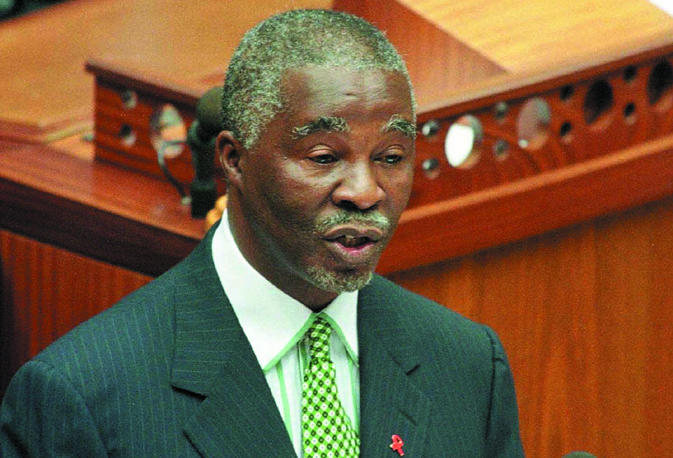South Africa's president, Thabo Mbeki, is once again at the centre of a medical and scientific storm over the issue of HIV and AIDS, attracting a great deal of criticism from the media. The last time it occurred it was over the announcement of a “miracle cure” for AIDS, which turned out to have no medical value whatever and proved to cause only harm to patients illegally receiving the drug. The inventors of the cure, Virodene, bypassed all the research protocols and controls at universities and went directly to the then minister of health, Nkosazana Dlamini-Zuma. Dr Zuma presented the pair and their claims to a cabinet meeting, and they were hailed for their “discovery.”
In the debacle that followed, Mbeki, then the deputy president, was thoroughly convinced by the “researchers.” He was so taken by their case that when a financial squabble broke out among the “research team” he personally intervened, arranging early morning secret meetings with Zuma to organise a peace meeting between the warring parties. The episode had considerable fallout, with the head of the Medicines Control Council losing his job, in part because the council had refused to allow clinical trials of the miracle cure.
The phenomenon now seems to be recurring. The president has reopened a 20 year old, dead and buried, scientific debate through the media about whether HIV causes AIDS. It first appeared in the public consciousness through the columns of a small circulation, investigative magazine called Noseweek, which ran a series through several editions raising all the old debates. The issue was carried further by the minister of health, Manto Tshabalala-Msimang, who, in a television appearance, started a campaign against GlaxoWellcome's drug zidovudine (AZT). It then emerged that an international group of scientists was to be called together to investigate all the scientific issues about AIDS. This group would include well known “dissidents,” such as the Californian microbiologist Peter Duesberg, and would explore questions including whether HIV causes AIDS.
It has been almost impossible for journalists to ascertain what the president and his health minister actually believe. At the end of last week, however, their views became clear in a series of articles and letters in several newspapers. Mbeki believes that AIDS is not caused by HIV, that those who seek to ridicule this are themselves not thinking broadly enough, and that multinational drug companies seek only to profit from the disease. The local scientific community, according to the print media, is appalled by his views.
The president's spokesman, Parks Mankahlana, writing in the influential daily paper Business Day, attacked Mbeki's detractors, particularly the pharmaceutical and medical insurance companies, whose shareholders, he postulated, would benefit from the AIDS crisis in South Africa. “The international panel of scientists,” he wrote, “must strive to give us answers to all the unknowns. It must attempt to unravel the mysteries of the HIV/AIDS virus.”
A rejoinder was published later in the week by GlaxoWellcome's local chief executive officer, whose company had borne the brunt of the attacks by Mbeki and Tshabalala-Msimang, both of whom are adamant they will not buy zidovudine for pregnant women. Phillip van Niekerk, editor of the newspaper Mail & Guardian, said on a national radio programme that the attack on pharmaceutical companies almost suggested that the companies had manufactured the disease in order to make money. Zidovudine had become the focus of media attention because the government decided not to supply the drug to stop vertical transmission of HIV from mother to offspring or for women immediately after rape. Both rape and AIDS babies were obvious points for media attention.
It has become necessary for journalists to look for coding in the words used by Mbeki and Tshabalala-Msimang when they make public announcements. The publicist working for the AIDS “dissidents,” Anita Allen, has told journalists that she has spoken to the president and health minister, that they agree with her views, and that they will, in speeches, refer to poverty when talking about AIDS. It seems that the dissidents' argument is that the opportunistic infections previously attributed to AIDS are actually caused by poverty, not HIV infection and AIDS. On cue, both Mbeki and Tshabalala-Msimang have referred to poverty when talking about AIDS.
Since almost no journalists are able to talk directly either to the president or to the minister of health, most have been left to interpret second hand reports. Among these was an interview given to the state broadcaster, the South African Broadcasting Company, on its early morning radio current affairs programme by another Californian dissenter, David Rasnick. He surprised listeners by saying that President Mbeki had telephoned him in the United States to discuss his views and solicit his support in Mbeki's fight against zidovudine. The Mail & Guardian, Financial Mail, Sunday Times, and Sunday Independent, all influential weekly newspapers, have run articles speculating on the need of the president to take such an odd line in the face of 20 years of research.
Figure.

OBED ZILWA/AP PHOTO
Thabo Mbeki fuels AIDS controversy


